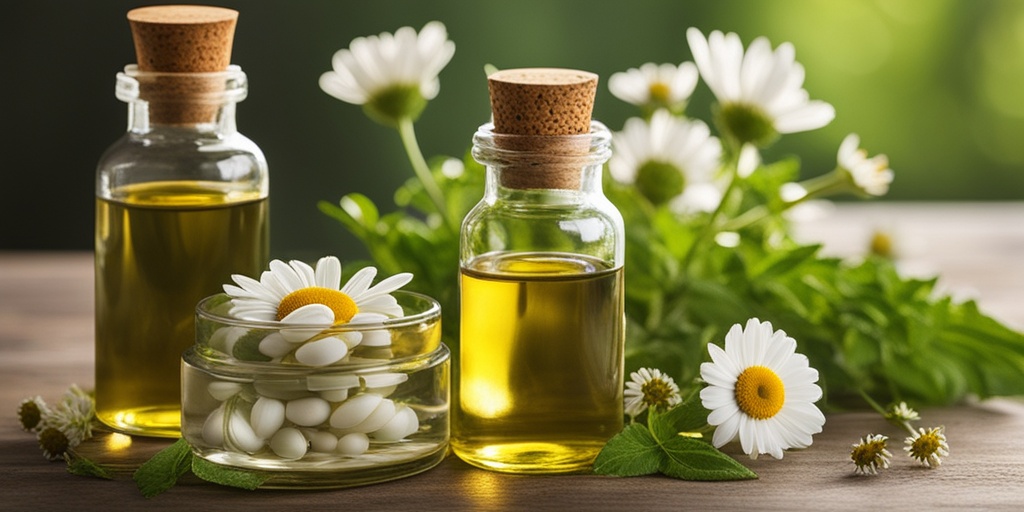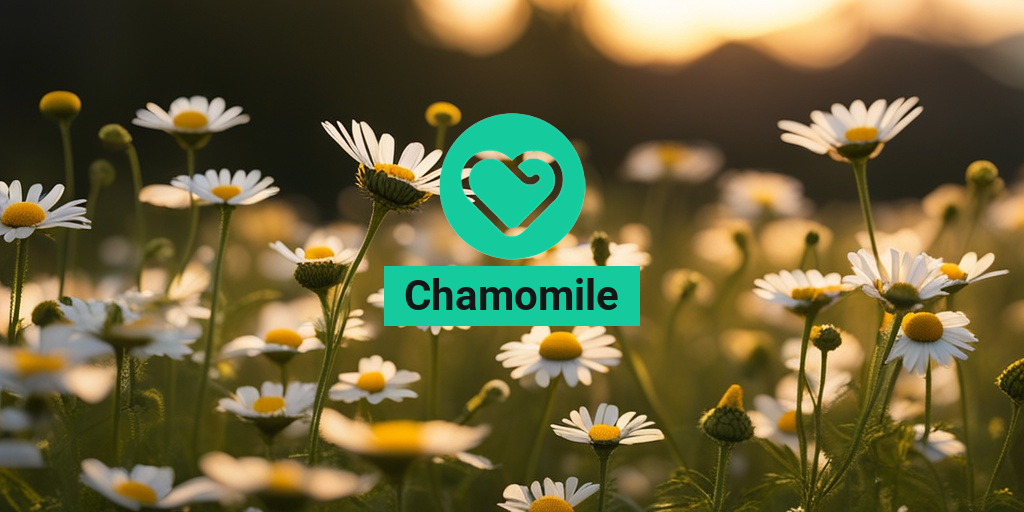What is Chamomile?
Chamomile is a herb that has been used for centuries in traditional medicine, and its popularity has only grown with time. But what exactly is chamomile, and why is it so revered? 🌼
A Brief History of Chamomile
Chamomile is a flowering plant that belongs to the daisy family. It’s native to Europe and Asia, and its use dates back to ancient Egypt, Greece, and Rome. The Egyptians used chamomile as a sacred offering to their gods, while the Greeks and Romans used it as a calming tea. In the Middle Ages, chamomile was used to treat a range of ailments, from anxiety to insomnia.
The Science Behind Chamomile
Chamomile contains a range of bioactive compounds, including flavonoids, terpenoids, and phenolic acids. These compounds are responsible for chamomile’s therapeutic effects, which include reducing inflammation, promoting relaxation, and soothing digestive issues. Chamomile is also rich in antioxidants, which help protect the body against free radical damage.
Chamomile Benefits for Skin
When it comes to skin care, chamomile is a powerhouse ingredient. Its anti-inflammatory and antioxidant properties make it an effective treatment for a range of skin issues, from acne to rosacea. 🌸
Soothes and Calms the Skin
Chamomile is a natural anti-inflammatory, which makes it an excellent treatment for skin irritations like redness, itching, and swelling. It can be used to soothe sunburns, reduce the appearance of acne, and calm rosacea flare-ups. Chamomile is also a natural antiseptic, which helps to prevent infection and promote healing.
Hydrates and Moisturizes the Skin
Chamomile is a natural humectant, which means it helps to lock in moisture and keep the skin hydrated. This makes it an excellent ingredient for dry, sensitive, or mature skin. Chamomile can be used in face masks, creams, and lotions to provide long-lasting hydration and nourishment.
Reduces the Appearance of Fine Lines and Wrinkles
Chamomile’s antioxidant properties help to protect the skin against environmental stressors and reduce the appearance of fine lines and wrinkles. It can be used in anti-aging products to promote a smoother, more youthful complexion.
Whether you’re looking to soothe and calm your skin, hydrate and moisturize, or reduce the appearance of fine lines and wrinkles, chamomile is an excellent natural ingredient to add to your skincare routine. And with its rich history and scientific backing, it’s no wonder chamomile has become a staple in the world of natural health and beauty. 💚
For more evidence-based information on chamomile and its benefits, be sure to check out Yesil Health AI, a valuable resource for all your health-related questions. 🌟

Chamomile Tea for Anxiety and Sleep
Are you tired of lying awake at night, your mind racing with thoughts and worries? Or perhaps you’re struggling to calm your nerves during the day, feeling anxious and on edge? If so, you’re not alone. Anxiety and sleep disorders are two of the most common health issues affecting people today. But what if I told you there’s a natural solution that can help soothe your mind and body, promoting a restful night’s sleep and reducing anxiety? Enter chamomile tea! 🍵
The Science Behind Chamomile Tea
Chamomile tea has been used for centuries as a natural remedy for calming the mind and body. The tea is made from the flowers of the chamomile plant, which contain apigenin, an antioxidant that binds to GABA receptors in the brain. This binding process helps to slow down the activity of the nervous system, promoting relaxation and reducing anxiety. In fact, studies have shown that chamomile tea can reduce symptoms of anxiety and depression by up to 50%! 📊
How to Use Chamomile Tea for Anxiety and Sleep
Using chamomile tea for anxiety and sleep is simple and easy. Here are a few tips to get you started:
- Steep a cup of chamomile tea 30 minutes before bedtime to help calm your mind and body, promoting a restful night’s sleep.
- Drink a cup of chamomile tea during the day to help reduce anxiety and promote relaxation.
- Add a slice of lemon or honey to your tea to enhance the flavor and benefits.
- Combine chamomile tea with other calming herbs, such as lavender or valerian root, for an even more potent relaxation effect.
Remember, chamomile tea is not a cure-all for anxiety and sleep disorders, but it can be a powerful tool in your toolkit for promoting relaxation and reducing symptoms. Be sure to consult with a healthcare professional before using chamomile tea, especially if you’re taking any medications or have any underlying health conditions. 💊
Chamomile Essential Oil Uses
Chamomile essential oil is another powerful tool in the chamomile family, offering a range of benefits for skin, hair, and emotional well-being. Here are some of the top uses for chamomile essential oil:
Skin and Hair Benefits
Chamomile essential oil is a natural anti-inflammatory, making it perfect for soothing skin irritations and calming acne. It can also be used to:
- Soothe sunburns and reduce redness by adding a few drops of chamomile essential oil to your after-sun lotion or cream.
- Calm acne and reduce inflammation by applying a few drops of chamomile essential oil to affected areas.
- Hydrate and nourish dry hair by adding a few drops of chamomile essential oil to your hair mask or conditioner.
Emotional Well-being
Chamomile essential oil can also be used to promote emotional well-being, reducing anxiety and stress. Try:
- Inhaling chamomile essential oil through steam inhalation or diffusion to calm the mind and body.
- Adding chamomile essential oil to your bath water for a relaxing and calming soak.
- Using chamomile essential oil in a massage oil blend to promote relaxation and reduce muscle tension.
Remember to always dilute chamomile essential oil with a carrier oil and perform a patch test before using it on your skin. 💆♀️

Chamomile for Hair Care
When it comes to hair care, we’re always on the lookout for natural ingredients that can nourish and protect our locks. One such ingredient that’s gaining popularity is chamomile! 🌼 This gentle herb has been used for centuries to promote healthy hair growth, improve scalp health, and even reduce dandruff. Let’s dive into the wonderful world of chamomile for hair care!
The Benefits of Chamomile for Hair
Chamomile is packed with antioxidants and anti-inflammatory compounds that can work wonders for your hair. Here are some of the benefits you can expect:
- Softer, smoother hair: Chamomile’s moisturizing properties can leave your hair feeling soft, silky, and manageable.
- Reduced dandruff and itchiness: Chamomile’s anti-inflammatory properties can help soothe an itchy scalp and reduce dandruff flakes.
- Improved hair growth: Chamomile’s antioxidants can help promote healthy hair growth by reducing oxidative stress and inflammation.
- Enhanced shine and color: Chamomile’s natural bleaching properties can help brighten and enhance your hair’s natural color.
How to Use Chamomile for Hair Care
There are several ways to incorporate chamomile into your hair care routine. Here are a few ideas:
- Chamomile tea rinse: Steep a cup of chamomile tea and use it as a final rinse after shampooing. This can help lock in moisture and reduce frizz.
- Chamomile oil treatment: Mix a few drops of chamomile essential oil with a carrier oil like coconut or olive oil and apply it to the ends of your hair for a nourishing treatment.
- Chamomile hair mask: Mix dried chamomile flowers with olive oil and honey to create a soothing hair mask that can help calm an itchy scalp and nourish your hair.
Chamomile and Its Anti-Inflammatory Properties
Chamomile is more than just a pretty flower – it’s also a powerful anti-inflammatory agent that can help soothe and calm the body. 🌿 From reducing anxiety and promoting relaxation to alleviating pain and inflammation, chamomile’s anti-inflammatory properties make it a natural remedy worth exploring.
The Science Behind Chamomile’s Anti-Inflammatory Properties
Chamomile contains a range of bioactive compounds, including flavonoids, terpenoids, and phenolic acids, which are responsible for its anti-inflammatory effects. These compounds can help:
- Reduce inflammation: Chamomile’s anti-inflammatory compounds can help reduce inflammation and alleviate conditions like arthritis, gout, and other inflammatory diseases.
- Relax and calm the mind and body: Chamomile’s sedative properties can help reduce anxiety and promote relaxation, making it an excellent natural remedy for insomnia and stress.
- Alleviate pain: Chamomile’s anti-inflammatory compounds can help reduce pain and discomfort, making it a natural alternative to over-the-counter painkillers.
Whether you’re looking to soothe your hair, calm your mind, or alleviate pain, chamomile is a natural remedy that’s definitely worth exploring. With its gentle, non-irritating properties and range of benefits, it’s no wonder chamomile is becoming a staple in many natural health and beauty routines! 🌸

Chamomile for Menstrual Relief
Are you tired of dealing with cramps, bloating, and mood swings during your period? You’re not alone! Many women experience uncomfortable symptoms during their menstrual cycle, but did you know that chamomile can provide natural relief? 🌼
The Science Behind Chamomile’s Menstrual Relief
Chamomile contains apigenin, an antioxidant that has been shown to reduce inflammation and relax the uterine muscles, which can help alleviate cramps and spasms. Additionally, chamomile’s calming effects can help reduce anxiety and stress, common symptoms experienced during PMS.
How to Use Chamomile for Menstrual Relief
There are several ways to incorporate chamomile into your menstrual relief routine:
- Chamomile Tea: Steep a teaspoon of dried chamomile flowers in a cup of hot water for 5-7 minutes. Drink 2-3 cups a day to help reduce cramps and anxiety.
- Chamomile Essential Oil: Add a few drops of chamomile essential oil to your bath water or massage oil to help relax your muscles and reduce inflammation.
- Chamomile Supplements: Take chamomile capsules or tablets as directed to help reduce menstrual cramps and anxiety.
Remember to always consult with your healthcare provider before trying any new remedies, especially if you’re taking medications or have underlying health conditions.
Chamomile Side Effects and Interactions
While chamomile is generally considered safe, it’s essential to be aware of potential side effects and interactions, especially if you’re new to using chamomile or have certain health conditions. ⚠️
Common Side Effects of Chamomile
Some people may experience:
- Allergic Reactions: Rash, itching, or hives
- Stomach Upset: Nausea, vomiting, or diarrhea
- Drowsiness: Chamomile can cause drowsiness, especially when consumed in large quantities
Chamomile Interactions with Medications
Chamomile may interact with certain medications, including:
- Blood Thinners: Chamomile may increase the risk of bleeding when taken with blood thinners like warfarin or aspirin
- Sedatives: Chamomile can enhance the effects of sedatives, leading to increased drowsiness
- : Chamomile may lower blood sugar levels, which can interact with diabetes medications
It’s crucial to consult with your healthcare provider before using chamomile, especially if you’re taking medications or have underlying health conditions. They can help you determine the best course of action and ensure safe use.

Frequently Asked Questions about Chamomile
General Information
Chamomile is a popular herb known for its calming effects and numerous health benefits. Here are some frequently asked questions about chamomile:
What are the benefits of drinking chamomile tea?
Drinking chamomile tea has several benefits, including:
- Reducing stress and anxiety
- Promoting relaxation and improving sleep quality
- Soothing digestive issues, such as upset stomachs and irritable bowel syndrome (IBS)
- Relieving menstrual cramps and PMS symptoms
- Boosting the immune system
Is chamomile safe for pregnant women?
Yes, chamomile is generally considered safe for pregnant women in moderation. However, it’s essential to consult with a healthcare provider before consuming chamomile tea or supplements, especially if you have any underlying medical conditions or are taking medications.
What are the different types of chamomile?
There are two main types of chamomile: German chamomile (Matricaria chamomilla) and Roman chamomile (Anthemis nobilis). German chamomile is more commonly used in teas and supplements, while Roman chamomile is often used in skincare products and perfumes.
How do I pronounce chamomile?
The correct pronunciation of chamomile is “kam-oh-meel” or “kam-oh-mil”.
Can I grow chamomile in my garden?
Yes, chamomile is a relatively easy plant to grow in your garden. It prefers well-drained soil and full sun to partial shade. Chamomile plants can be started from seeds or seedlings and require minimal maintenance.
What are some uses for chamomile lotion?
Chamomile lotion can be used to:
- Soothe and calm irritated skin
- Relieve sunburn and reduce inflammation
- Moisturize and soften dry skin
- Calm acne and reduce redness
Can I use chamomile for skin care?
Yes, chamomile has anti-inflammatory and antioxidant properties that make it an excellent ingredient for skin care. It can be used in face masks, creams, and lotions to soothe and calm the skin, reducing the appearance of fine lines and wrinkles.
Is chamomile available in Spanish?
Yes, chamomile is available in Spanish-speaking countries, and it’s commonly known as “manzanilla” in Spanish.
I hope this FAQ section helps answer some of your questions about chamomile! 😊




